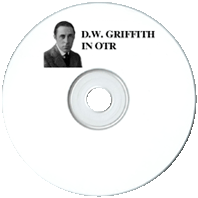

Best known for his groundbreaking but controversial film, Birth of a Nation (1915).

4 old time radio show recordings
(total playtime 2 hours)
available in the following formats:
1 MP3 CD
or
3 Audio CDs
Text on OTRCAT.com ©2001-2025 OTRCAT INC All Rights Reserved. Reproduction is prohibited.
D.W. Griffith
(1875 – 1948)

David Wark Griffith was born in Oldham County, Kentucky, 1875, to Mary and "Roaring Jake" Griffith. His father had been a Colonel in the Confederate Army and injured while serving. D.W. grew up on his father's stories of the Civil War and the glories of the antebellum South, but the family struggled with poverty after the father died when David was very young. His mother abandoned the family farm and moved her brood to Louisville where she ran a boarding house. D.W. spent as much time as he could in the library, but left school at 14 to help his mother make ends meet.
He wanted to become a playwright but was unable to sell his plays. He did build a decent acting resume' and eventually began working in front of the camera for the Edison Film Company. Griffith became a stage extra and writer for the Biograph Company in 1908. The companies lead director fell ill and his son tried to replace him but was not cut out to direct. Griffith was given a shot and had successes beginning with The Adventures of Dollie. He began to develop techniques which filmmakers take for granted today, such as cross-cutting to show simultaneous action in different locations, fade-in/fade-out, flashbacks, and using close-ups during a scene. He also worked with some of the earliest stars of the medium, like Mary Pickford, Lionel Barrymore, Dorothy and Lillian Gish, Allen Hale Sr., and Harry Carey. In 1910, Griffith went to California with members of the Biograph company to make location shots for Ramona (1910) and to investigate the possibility of setting up a studio in the West. He made the very first Hollywood movie, In Old California (1910), and other film companies began flocking to Hollywood.

Trying to answer his critics, Griffith followed up with Intolerance (1916), widely considered a masterpiece of the silent film era. The picture follows four storylines, the fall of Babylon, the story of Christ's crucifixion, the massacre of French Huguenots in 1572, and a "modern" story of workers against capitalist bosses. Rather than presenting the stories chronologically, Griffith used cross-cuts to show them simultaneously, building a powerful condemnation of mankind's intolerance of others. Although Intolerance was a hit with critics, audiences were expecting a repeat of the violence and action of Birth of a Nation, and the new film was a box-office failure.
Trying to recover financially from Intolerance (Griffith sank most of his personal fortune into the failed picture) he went to work for other studios. Griffith brought together Mary Pickford, Douglas Fairbanks, and Charlie Chaplin to form United Artists. Although the other players would enjoy great success with UA projects, Griffith never recovered the glory of Birth of a Nation or Intolerance. Griffith was found unconscious on the morning of July 23, 1948, in the lobby of the Knickerbocker Hotel in Los Angeles where he had been living alone. He had suffered a cerebral hemorrhage and died while being transported to the hospital. Orson Welles said "I have never really hated Hollywood except for its treatment of D. W. Griffith. No town, no industry, no profession, no art form owes so much to a single man."
A Star on the Hollywood Walk of Fame at 6535 Hollywood Blvd honors contributions to Motion Pictures by D.W. Griffith. D.W. Griffith Middle School in Los Angeles was named in his honor, but because of the racist reputation of Birth of a Nation, there have been attempts to renamed the institution.
Text on OTRCAT.com ©2001-2025 OTRCAT INC All Rights Reserved. Reproduction is prohibited.
You have reached the maximum number of votes for a unregistered user.
Please login or create a new account to continue...
You have reached the maximum number to down votes in this page.



DW Griffith Disc A001
|
Add Audio CD to Cart - $5.00 |
DW Griffith Disc A002
|
Add Audio CD to Cart - $5.00 |
DW Griffith Disc A003
|
Add Audio CD to Cart - $5.00 |
Please wait...
COMMENTS
Be the first to comment on "DW Griffith"
Leave a comment